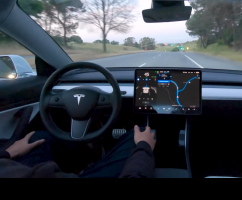
— A Tesla Full Self-Driving lawsuit alleges consumers have been lied to for years concerning the capabilities of Autopilot, Enhanced Autopilot and Full Self-Driving features.
Known as advanced driver assistance systems, Tesla allegedly makes false and misleading claims about its technology and when it will be available and safe to use.
Tesla allegedly markets its Autopilot and Full Self-Driving features as technology that will make the vehicles autonomous, but the class action lawsuit alleges the vehicles did not and cannot operate as self-driving vehicles.
The Tesla Full Self-Driving lawsuit includes:
"All persons who, from January 1, 2016, to the present (the 'Class Period'), purchased or leased from Tesla, Inc. (or any entity it directly or indirectly owns or controls, including Tesla Lease Trust and Tesla Finance LLC) a new Tesla vehicle with 'Autopilot,' 'Enhanced Autopilot,' or 'Full Self-Driving Capability.'"
The Tesla Full Self-Driving class action lawsuit was filed after the California Department of Motor Vehicles alleged there were problems with Tesla's marketing materials for its vehicles.
The DMV said it had issues with Tesla's advertising regarding Autopilot and Full Self-Driving Capability and how those terms were used to sell vehicles.
The California DMV referenced this statement from Tesla:
"The system is designed to be able to conduct short and long-distance trips with no action required by the person in the driver’s seat."
California also saw problems with this claim:
"From Home – All you will need to do is get in and tell your car where to go. If you don’t say anything, your car will look at your calendar and take you there as the assumed destination. Your Tesla will figure out the optimal route, navigating urban streets, complex intersections and freeways."
And once a vehicle reached its destination:
"When you arrive at your destination, simply step out at the entrance and your car will enter park seek mode, automatically search for a spot and park itself. A tap on your phone summons it back to you."
The class action lawsuit contends those self-driving descriptions represent the vehicles as autonomous when they aren't.
Florida plaintiff Christopher Mallow filed the lawsuit after he purchased a new 2020 Model 3 Tesla Performance Edition in November 2019 and paid an additional $7,000 for the “Full Self-Driving Capability” option.
According to the plaintiff, Tesla has continually made deceptive and misleading statements about the capabilities of Autopilot and Full Self-Driving, especially on its website.
The plaintiff alleges customers have not received vehicles capable of “full self-driving in almost all circumstances," and that could “conduct short and long distance trips with no action required by the person in the driver's seat” and with a “probability of safety at least twice as good as the average human driver.”
The Tesla Full Self-Driving lawsuit was filed in the U.S. District Court for the Northern District of California: Christopher Mallow v. Tesla, Inc., et al.
The plaintiff is represented by Casey Gerry Schenk Francavilla Blatt & Penfield.




